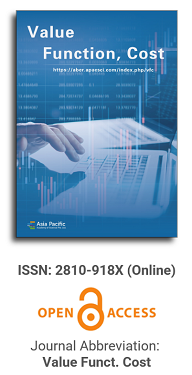
Asia Pacific Academy of Science Pte. Ltd. (APACSCI) specializes in international journal publishing. APACSCI adopts the open access publishing model and provides an important communication bridge for academic groups whose interest fields include engineering, technology, medicine, computer, mathematics, agriculture and forestry, and environment.
Research on Digital Economy and High Quality Development of Regional Economy
Vol 4, Issue 1, 2024
Download PDF
Abstract
The experience of developed countries shows that digital economy can promote high -quality economic development. By constructing a comprehensive evaluation index system, this paper measures the digital economy and high quality economic development level of Zhejiang province from 2013 to 2019. First, the coupling model is used to measure the dynamic evolution process of digital economy and high-quality economic development, then the general linear linear regression model is fitted to explore the promotion degree of digital economy to high-quality economic development, and finally, the mediationeffect model is used to analyze the mechanism of digital economy to promote high -quality economic development. The following conclusionsare drawn: In recent years, the development level of digital economy in Zhejiang province continues to improve, and the coupling coordination degree of digital economy and high-quality economic development gradually reaches a good level. Digital economy can promote high-quality economic development. Every 1% increase in the level of digital economy will increase the level of high-quality economic development by 0.4694%. The index of scientific and technological innovation is taken as a mediating variable, and the test model is constructed. The mediating effect is found to be significant, which indicates that digital economy empowers scientific and technological innovation to promote high-quality economic development. Based on this, this paper puts forward some suggestions to provide reference for thehigh quality economic development of Zhejiang Province.
Keywords
References
- Ding Yulong. The origin, connotation and measurement of digital economy: a literature review[J]. Social Science Dynamics, 2021(08):57-63.
- Zou Shuisheng. Digital economy connotation, current situation and path analysis of driving new economy[J]. Science and Technology Economy Guide, 2021, 29(17): 209-210.
- Henry D, Cooke S, Montes S. The Emerging Digital Economy [R/OL].(1998)[2017-02-28]. http://www.esa.doc.gov/sites/default/files/emergingdig_0.pdf.
- LU Jingchi, YU Jiankun, LIU Mingyao. Research on the Evaluation of Digital Economy Development-Taking Yunnan Province as an Example[J]. Contemporary Economy, 2021(02):60-65.
- Liang Yao. Research on the Impact of Digitalization Development Level on Industrial Structure Upgrading in Shaanxi Province [J]. Modern Business Industry, 2021, 42(17):12-13.
- Duan square, Guo Junmao. The Heterogeneous Impact of Digital Economy on the Development of China's Distribution Industry-An Empirical Test Based on Prefecture-Level City Data[J]. Research on Business Economy, 2021(06):15-19.
- Zhang Yuchuan, Qin Shanshan. An empirical study on the digital economy to promote regional economic growth-Based on 2010-2019 data of the long economic belt [J]. Logistics Technology, 2021, 40(01):56-62.
- Ning Zhaoshan. Digital Economy, Factor Marketization and High Quality Economic Development[J]. Changbai Journal, 2021(01):114-120.
- Li Xiaohua. New features of the digital economy and the formation mechanism of the new momentum of the digital economy[J]. Reform, 2019(11):40-51.
- Li Xue, Wu Fuxiang, Zhu Lile. Digital economy and regional innovation performance[J]. Journal of Shanxi University of Finance and Economics, 2021, 43(05): 17-30.
- Qi Yudong, Liu Cuihua, Ding Shulei. Development of Digital Economy, Employment Structure Optimization and Employment Quality Enhancement[J]. Economics Dynamics, 2020(11):17-35.
- Duan Bo, Shao Chuanlin. Has the Digital Economy Exacerbated Regional Disparities? -Empirical evidence from 284 prefecture-level cities in China [J]. World Geography Research, 2020, 29(04):728-737.
- WEN Zhonglin, YE Baojuan. Mediation effects analysis:Methods and model development[J]. Advances in Psychological Science, 2014, 22(05):731-745.
- WANG Cheng, TANG Ning. Spatio-temporal characteristics and pattern evolution of the coupled spatial functions and coordination of the three livelihoods in rural Chongqing[J]. Geography Research, 2018, 037(006):1100-1114.
- SUN Yu, JIANG Ningning, CUI Yin. Temporal and spatial evolution of the coordinated development of ecological civilization and urbanization in Beijing-Tianjin-Hebei[J]. China Population-Resources and Environment, 2020, 30(02): 138-147.
- ZHANG Zhihe, GUO Xing, YI Lan. Innovation-driven mechanism for high-quality economic development[J]. Journal of Xi'an Jiaotong University (Social Science Edition), 2019, 39(06): 39-46.
- Jing WJ, Sun BW. Digital economy for high-quality economic development: a theoretical analysis framework[J]. The Economist, 2019(02):66-73.
- Ren Baoping. Logic, Mechanism and Path of Digital Economy Leading High-Quality Development[J]. Journal of Xi'an University of Finance and Economics, 2020, 33(02):5-9.
- Song Yang. Digital economy and high-quality development in the perspective of economic development quality theory[J]. Guizhou Social Science, 2019(11):102-108.
- Jin Beibei. An economic study on Hgh-Quality Development[J]. China Industrial Economy, 2018(04):5-18.
- Luo Yihong. Analysis on the Mechanisms of Big Data, Artificial Intelligence, Blockchain and Other ICTs for High-quality Development of Digital Economy[J]. Quality Development Mechanism Exploration[J]. Guizhou Social Science, 2019(12):122-132.
- Tian Li. Comparative study on the concept of digital economy in various countries[J]. Economic Research Reference, 2017(40):101-106, 112.
- Huang Qunhui, Yu Yongze, Zhang Songlin. Internet development and manufacturing productivity improvement: internal mechanism and Chinese experience[J]. China Industrial Economy, 2019(08):5-23.
Supporting Agencies
Copyright (c) 2024 Author(s)

This work is licensed under a Creative Commons Attribution-NonCommercial 4.0 International License.

This site is licensed under a Creative Commons Attribution 4.0 International License (CC BY 4.0).
Zhibiao Gao
Nankai University, China

